2017_2018学年八年级英语下册Unit1What’sthematterPeriod1教案人教新目标版
人教版八年级英语下册 Unit 1 What’s the matter?知识点复习

人教版英语八年级下册第一单元知识点过关Unit 1 What’s the matter?一、重点短语1. have a fever 发烧,具体运用:She has a fever and she should lie down and rest.2. have a cough 咳嗽,cough既可以作名词,也可以作动词3. have a toothache 牙疼;tooth牙齿+ ache疼痛toothache 牙痛4. talk too much 说得太多;类似短语:eat too much吃太多5. drink enough water 喝足够的水;take enough money带够钱6. have a cold 受凉、感冒;也可以用catch a cold7. have a stomachache 胃疼;stomach胃+ache疼痛stomachache 胃疼8. have a sore back 背疼;sore疼痛+back背sore back背疼9. have a sore throat 喉咙痛10. lie down and rest 躺下休息11. hot tea with honey 加蜂蜜的热茶;with表示“带有”12. see a dentist 看牙医;看医生用“see”13. get an X-ray 拍X 光片14. take one’ s temperature 量体温;量体温、服药都用“take”15. put some medicine on sth. 在……上面敷药;例如:put some medicine on the cut在切口处敷药16. feel very hot 感到很热;feel感官动词,后接形容词17. sound like 听起来像;例如:sounds like a good idea 听起来像个好主意18. all weekend 整个周末;类似短语:all day \ all night \ all month19. in the same way 以同样的方式20. go to a doctor 看医生21. go along 沿着……走;类似短语:walk along22. on the side of the road 在马路边23. shout for help 大声呼救24. without thinking twice 没有多想;without是介词,后接动词ing形式25. get off 下车;反义词get on上车26. have a heart problem 患有心脏病27. to one’ s surprise 使....... 惊讶的;例如:to my surprise \ to his surprise28. thanks to 多亏了、由于;例如:Thanks to the the doctors , the patient was saved in time. 多亏了医生们,这个病人及时被救了。
人教新目标八年级英语下册Unit 1 What's the matter单词速记

Unit 1matter /'mætə(r)/ n. 问题; 事情【台湾词中词】毯子经常出现问题。
[例]What' s the matter?怎么了? 出什么事了?mat[mæt]n.垫子,簇,小地毯,(体育运动用的)厚垫子垫子的问题sore /sɔ:(r)/ adj. 疼痛的; 酸痛的[例]I have a sore back.我后背痛。
【词汇倍增】我的core有点sorecore [kɔː(r)]n. 核心,(水果的)果心,(物体的)中心部分have a cold 感冒[例]I have a cold.我感冒了。
stomachache /'stʌməkeɪk/ n. 胃痛; 腹痛have a stomachache 胃痛[例]I have a stomachache.我胃痛。
【英国字母索源法】stomach(胃)+ache(痛)foot /fʊt/ n. 脚; 足【英国字母索源法】f代表“五官”[例]One of my feet is dirty.我的一只脚脏了。
neck /nek/ n. 颈; 脖子【英国字母索源法】n代表“细长”[例]The neck of the glass is dirty.杯颈脏了。
stomach /'stʌmək/ n. 胃; 腹部[例]what a stomach he has got !他可真是个大腹便便的人!【脑图单词速记】蛇s吐to马ma吃chthroat /θrəʊt/ n. 咽喉; 喉咙 p.1【英国字母索源法】thr代表“三”throat喉咙--通向三处,Third第三 thirteen十三 thirty三十。
[例]She has a very sore throat now.她现在嗓子疼的很厉害。
【词汇倍增】一只goat(山羊)穿件coat(衣服)上了boat(船)掉进moat(城壕)摔断throat (喉咙)fever /'fi:və/ n. 发烧[例] She has a fever.她发烧了。
八年级下册英语unit1-unit10课文翻译

Unit1What’s the matter? 2dA丽萨,你好吗?B我头疼,并且脖子不能动。
我该怎么办?我应该量体温吗?A不,听起来不像是你发烧。
周末你做什么了?B我整个周末都在玩电脑游戏。
A那很可能就是原因,你需要离开电脑休息几次。
B是的,我想我是一个姿势做的太久没有移动。
A我认为你应该躺下休息。
如果明天你的头和脖子还痛的话,就去看医生。
B好的,谢谢,曼迪。
3a公交车司机和乘客救了一位老人昨天上午九点,26路公交车正行驶在中华路上,这时司机看到一位老人躺在路边。
在他旁边一位妇女在喊救命。
公交车司机,24岁的王平没有多想就停下来公交车。
他下了车,问那个妇女发生了什么事。
她说那个人有心脏病,应该去医院。
王先生知道他必须快点行动。
他告诉乘客他必须送老人去医院。
他希望大部分或全部乘客下车去等下一辆公交车。
但出乎他的意料,他们都同意和他一起去。
一些乘客帮助王先生把那个老人移到公交车上。
多亏了王先生和乘客们。
医生及时挽救了老人的生命。
“许多人因为不想有麻烦而不想帮助别人,这真令人难受”,一位乘客说。
“但是这位司机没有考虑自己。
他只考虑挽救一条生命。
”2b他失去了手臂但还在爬山阿伦是一个对爬山感兴趣的美国人。
作为一名登山者,阿伦习惯于冒险。
这是关于做危险运动的令人兴奋的事情之一。
"有许多次,阿伦因为(意外)事故几乎失去生命。
在2003年4月26日,在犹他州登山时他发现自己在非常危险的处境。
在那天,当阿伦独自登山时,他的手臂被压在落在他身上的一块360千克的岩石下。
因为他的手臂不能自由活动,他在那儿待了五天,希望有人会发现他。
但当他的水喝完了,他知道他将不得不采取措施来挽救的生命了。
他不愿意那天就死去。
因此他用刀子切除了他的一半右臂。
然后,他用左臂给自己打上绷带以至于他不会失去太多的血。
这之后,他爬下山区寻求帮助。
在他失去手臂后,他写了一本名为《生死抉择》(又译作《生死两难》)的书。
他的意思是“处于一个你似乎无法拜托的困境之中”。
八年级英语下册 Unit 1 What’s the matter短语、句子练习(新版)人教新目标版
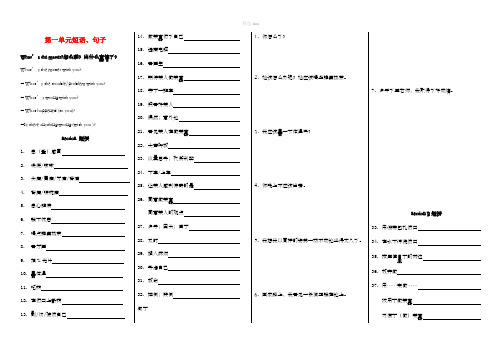
第一单元短语、句子What’ s the matter?怎么啦?出什么事情了?What’ s the matter with you?= What’s the trouble/problem with you?= What’ s wrong with you?= What happened (to you)?=Is there anything wrong (with you )?Section 短语1.患(重)感冒2.发烧/咳嗽3.头痛/胃痛/牙痛/背痛4.背痛/喉咙痛5.患心脏病6.躺下休息7.喝点蜂蜜热茶8.看牙医9.拍X光片10.量体温11.吃药12.在伤口上敷药13.割/切/擦伤自己14.做某事伤了自己15.远离电脑16.看医生17.期待某人做某事18.等下一班车19.照看好某人20.偶然;意外地21.看见某人在做某事22.大声呼救23.认真思考;权衡利弊24.下车/上车25.让某人感到惊奇的是26.同意做某事同意某人的观点27.多亏;因为;由于28.及时29.陷入麻烦30.考虑自己31.救命32.摔倒;跌倒句子1、你怎么了?2、她该怎么办呢?她应该喝些蜂蜜热茶。
3、我应该量一下体温吗?4、你晚上不应该出去。
5、我想我以同样的姿势一动不动地坐得太久了。
6、回家路上,我看见一条狗正躺在地上。
7、多亏了王老师,我取得了好成绩。
Section B短语33.用绷带包扎伤口34.在水下冲洗伤口35.按压住鼻子的两边36.放弃做37.用……来做……被用于做某事习惯于(做)某事38.让自己活得自在39.休息几天40.在烈日下41.感觉病了/感到不舒服42.划伤了膝盖43.流鼻血44.伤了背45.碰了头46.晒伤47.呼吸有问题48.被球打/碰了49.爬山(活动)50.去爬山51.对……有兴趣52.冒险53.失去生命54.因为55.亲自;独自56.(主语为物)耗尽;用光(主语为人)耗尽;用光57.准备做某事58.切掉他一半右臂59.失血太多60.左右为难;进退两难61.在困难的情况下62.摆脱;脱离63.学好英语的重要性64.做出好决定65.掌控一生66.坚持爬山67.活着还是死亡68.发生事故69.放弃做句子1、他在学习英语方面有困难。
八级英语下册UnitWhat'sthematter全单元教案新版人教新目标版

Unit 1 What's the matter年级八学科英语课型新授课时间主备人八年级英语组教学课题Unit 1 What’s the matter?Section A (1a~2d)课时 1教学目标1. 学习用英语表达身体各部位的名称及如何谈论身体健康状况。
2. 培养学生能运用所学语言简单地描述自己的健康状况及如何询问对方的身体健康状况。
3. 通过学习课文内容,养成健康的生活方式。
4. 教育学生学会关心他人,通过询问他人的健康情况并能给予帮助,增进人与人之间的感情。
重点难点教学重点:1.掌握情态动词should / shouldn’t.的用法.2.学习have的用法.教学难点:学会提供帮助的基本句型教学准备PPT教学过程1、新课导入:Step1: Can you name the parts of the body?让学生用英语所处器官名称。
Step2:Follow me:(让学生站起来完成韵律操)Everybody moves your bodyNod your head and touch your faceTouch your nose and close your eyesTouch your ears and clap your handsRaise your arms and look at your backTouch your stomach and tap your footSit down and move your legs2、设问导读:二次备课4. 如果你的头和脖子明天仍然疼的话,请去看医生。
五.拓展探究Homework: Make up a conversation between a doctor and a patient.课堂小结本课通过身体器官韵律操导入课时内容,激发学生的学习兴趣,提高课堂教学的效率,同时针对学生日常生活中的常见症状,让学生在列举过程中掌握患病方式的三种表达方式。
2017新目标八年级下册Unit1-What's-the-matter?测试题及答案
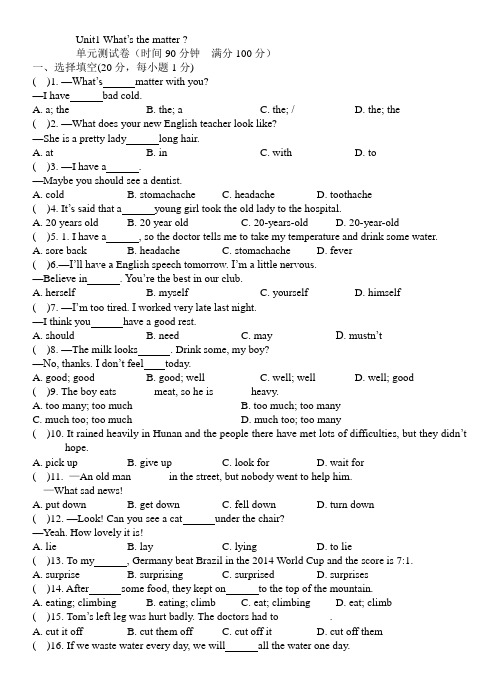
Unit1 What’s the matter ?单元测试卷(时间90分钟满分100分)一、选择填空(20分,每小题1分)( )1. —What’s matter with you?—I have bad cold.A. a; theB. the; aC. the; /D. the; the( )2. —What does your new English teacher look like?—She is a pretty lady long hair.A. atB. inC. withD. to( )3. —I have a.—Maybe you should see a dentist.A. coldB. stomachacheC. headacheD. toothache( )4. I t’s sa id that a young girl took the old lady to the hospital.A. 20 years oldB. 20 year oldC. 20-years-oldD. 20-year-old( )5. 1. I have a, so the doctor tells me to take my temperature and drink some water.A. sore backB. headacheC. stomachacheD. fever( )6.—I’ll have a English speech tomorrow. I’m a little nervous.—Believe in. You’re the best in our club.A. herselfB. myselfC. yourselfD. himself( )7. —I’m too tired. I worked very late last night.—I think you have a good rest.A. shouldB. needC. mayD. mustn’t( )8. —The milk looks. Drink some, my boy?—No, thanks. I don’t feel today.A. good; goodB. good; wellC. well; wellD. well; good( )9. The boy eats ______ meat, so he is ______ heavy.A. too many; too muchB. too much; too manyC. much too; too muchD. much too; too many( )10. It rained heavily in Hunan and the people there have met lots of difficulties, but they didn’t ______hope.A. pick upB. give upC. look forD. wait for( )11. —An old man ______ in the street, but nobody went to help him.—What sad news!A. put downB. get downC. fell downD. turn down( )12. —Look! Can you see a cat under the chair?—Yeah. How lovely it is!A. lieB. layC. lyingD. to lie( )13. To my, Germany beat Brazil in the 2014 World Cup and the score is 7:1.A. surpriseB. surprisingC. surprisedD. surprises( )14. After some food, they kept on to the top of the mountain.A. eating; climbingB. eating; climbC. eat; climbingD. eat; climb( )15. Tom’s left leg was hurt badly. The doctors had to _________.A. cut it offB. cut them offC. cut off itD. cut off them( )16. If we waste water every day, we will all the water one day.A. run outB. run out ofC. cut offD. get out of( )17. As students, the most important thing is that we should learn how to learn by ________. A. ourselves B. itself C. myself D. themselves ( )18. The Greens used to live in city and now they in the countryside.A. used to liveB. are used to liveC. are used to livingD. are used for living ( )19. Yao Ming made a to start the NBA Yao basketball school in March 2014.A. educationB. decisionC. adviceD. news( )20. —Mum, I’m not feeling well.—Oh, dear!A. Really?B. Not at all.C. What’s the matter?D. All right.二、完形填空(10分,每小题1分)Mary was ill yesterday. She went to see a doctor.“Doctor. I’m not feeling1at the moment, ”she said, “Every time I do my homework at night, I feel2. If I walk to school every day, I have to sit down and3for ten minutes. ”The doctor looked4Mary carefully. At last he said, “5serious, but I’m afraid you are6 too much. ”“I don’t u nderst and, what do you mean? ”asked Mary. “I mean you eat too much7, ”said the doctor.“Oh! Y ou mea n I’m too8. That’s a problem. ”said Mary. “What should I do if I don’t want to be heavy? ”“The answer is easy, ”said the doctor. “If you want to be thinner and healthier, you9eat a lot of food and you also should take more10. ”1. A. good B. bad C. well D. terrible2. A. hungry B. thirsty C. tired D. relaxed3. A. rest B. lie down C. stand D. look4. A. after B. over C. like D. for5. A. Too B. Not C. Nothing D. Very6. A. drinking B. sleeping C. working D. eating7. A. ice cream B. fruit C. food D. chicken8. A. fat B. healthy C. stressed out D. thin9. A. can B. can’t C. should D. shouldn’t10. A. homework B. sports C. exercise D. housework三、阅读理解(20分)A1. The children _______ can’t take the medicine for a stomachache.A. under 6 years oldB. under 12 years oldC. under 10 years oldD. under 7 years old2. If a middle-aged person with a cough wants to be well at home, he should ______ once a day ______.A. take two pills; after sleepB. take three pills; before sleepC. take two pills; before sleepD. take three pills; after sleep3. If an adult has a cold, he had better take ______ pills a day.A. twoB. threeC. fourD. six4. Five-year-old children can take _______kind(s) of medicine.A. threeB. twoC. oneD. none5. If a six-year-old boy has a cold, he should take ______ pills a day.A. sixB. fourC. threeD. twoBLast Saturday morning, on June 16th, we went camping along a path in Green Natural Park. We were happy because it was a sunny day. We were expecting an enjoyable two-day holiday. On the way, we kept singing and making jokes.However, in th e afternoon, when we finished our picnic at one o’clock, it was dark and windy. Soon, there was a shower. Unluckily, none of us brought an umbrella. We ran about but we could find no place to hide.Twenty minutes passed and it was still raining. There were hours to go before we reached the campsite(野营地). It was even worse that our small compass(指南针)showed that we went to the wrong way. We had lost our way!We had to make a quick decision as it was raining heavily. Chris said we could set up a tent to hide in, so Mary and Tom helped to set up the tent. Chris and I tried to make a fire to keep us warm. But we were unable to light the fire, as everything was wet. We dried ourselves, chatted and waited inside the tent. At about five o’clock, it stopped raining. We decided to give up the camping trip because all of us had been very tired.This camping trip may not be very successful but we know each other better. And the most important thin g I’ve learned from this trip is the importance of team spirit.6. The writer went camping in Green Natural Park.A. for 4 hoursB. for 3 daysC. in JuneD. in the afternoon7. It was even worse that they.A. had no picnicB. lost their wayC. couldn’t light the fireD. couldn’t know each other8. Chris suggested that they should in the rain.A. set up a tentB. reach the campsiteC. keep singingD. find a place to hide9. Which of the following is NOT true?A. It was sunny in the morning.B. None of them had an umbrella.C. They gave up the camping at last.D. They ran about to dry themselves.10. The writer has learned the importance of from the trip.A. making a decisionB. working togetherC. enjoying holidaysD. taking a compass四、任务型阅读(10分)Annie lived alone in Chicago. One day, she fell down in her bedroom and broke her leg. So she tried to call her friend Lisa. But she dialed(拨打)a wrong number. The call reached Taylor, an 18-year-old girl. She was a college student and she lived hundreds of miles away from Chicago.At that time Taylor was reading in bed. She thought it was somebody playing a joke. When she was going to hang up the phone, she heard a woman saying “Help! Help! ”From it Taylor thought something bad must have happened to the woman. After she got the woman’s name and address, Taylor called 911 at once. Then she tried to make Annie feel comfortable. She spoke to Annie on the phone till the doctors arrived at Annie’s house. At last Annie was taken to hos pital in time.As soon as Annie felt better, she wrote a letter to Taylor to thank her.根据短文内容, 简要回答下列问题。
人教版八年级英语下册《Unit 1 Unit 1 What’s the matter?》教案.doc
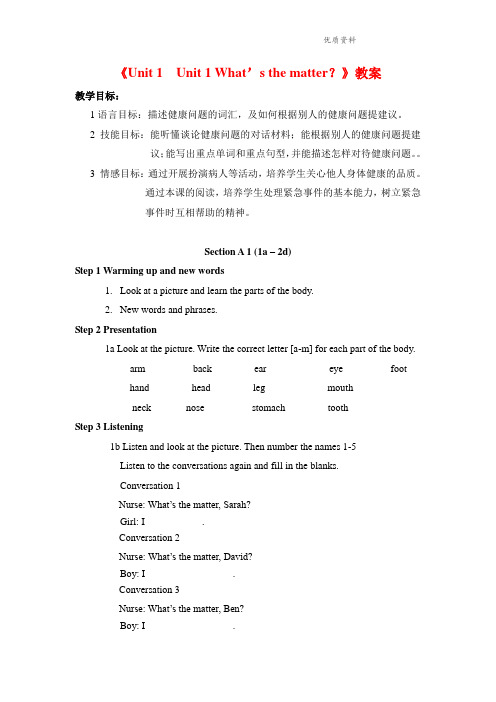
《Unit 1 Unit 1 What’s the matter?》教案教学目标:1语言目标:描述健康问题的词汇,及如何根据别人的健康问题提建议。
2 技能目标:能听懂谈论健康问题的对话材料;能根据别人的健康问题提建议;能写出重点单词和重点句型,并能描述怎样对待健康问题。
3 情感目标:通过开展扮演病人等活动,培养学生关心他人身体健康的品质。
通过本课的阅读,培养学生处理紧急事件的基本能力,树立紧急事件时互相帮助的精神。
Section A 1 (1a – 2d)Step 1 Warming up and new words1.Look at a picture and learn the parts of the body.2.New words and phrases.Step 2 Presentation1a Look at the picture. Write the correct letter [a-m] for each part of the body.___arm ___ back ___ ear ___ eye ___ foot___hand ___ head ___ leg ___ mouth___ neck ___nose ___ stomach ___ toothStep 3 Listening1b Listen and look at the picture. Then number the names 1-5Listen to the conversations again and fill in the blanks.Conversation 1Nurse: What’s the matter, Sarah?Girl: I ___________.Conversation 2Nurse: What’s the matter, David?Boy: I _________________.Conversation 3Nurse: What’s the matter, Ben?Boy: I _________________.Conversation 4Nurse: What’s the matter, Nancy?Girl: I _________________.Conversation 5Betty: What’s the matter, Judy?Ann: She __________________.Step 4 Speaking1c Look at the pictures. What are the students’ problems? Make conversati ons.ExamplesA: What’s the matter with Judy?B: She talked too much yesterday and didn’t drink enough water.She has a very sore throat now.A: What’s the matter with Sarah?B: She didn’t take care of herself on the weekend. She was p laying withher friends at the park yesterday. Then it got windy, but she didn’t puton her jacket. Now she has a cold.Step 5 Guessing gamesGuess what has happened to the students by using the important sentenc es. Step 6 Listening2a Listen and number the pictures [1-5] in the order you hear them.2b Listen again. Match the problems with the advice.Step 7 Speaking2c Make conversations using the information in 2a and 2bA: What’s the matter?B: My head feels very hot.A: Maybe you have a fever.B: What should I do?A: You should take your temperature.Step 8 Role–playImagine you are the school doctor. A few students have health problems.Role-play a conversation between the doctor and the students.2d Role –play the conversationStep 9 Language points and summary1. What’s the matter?这是人们特别是医生和护士询问病人病情时最常用的问句, 意思是“怎么了?”其后通常与介词with连用。
八年级下册unit1_what‘s_the_matter课文重难点讲解

Unit 1 What’s the matter?Section A1. What’ s the matter? 怎么啦?出什么事情了?【解析】matter/ ' mætə(r)) /n.问题;事情What’ s the matter with you?= What’s the trouble with you?= What’ s wrong with you?你怎么了?【注】:matter 和trouble 为名词,其前可加the 或形容词性物主代词,wrong 是adj. 不能加the【2013自贡3】18. —What’s the matter ______ Tom. He is wet through.—His car ran _______ the river.A.with; inB.to; intoC.with; into【用法】用于询问某人有什么病或某人遇到什么麻烦、问题其后跟询问对象时,与介词with连用。
即:What’s the matter with sb.?= What’s your trouble?= What’s up?= What happens to sb.?—What’s the matter with you ?—I have a bad cold.( ) ①What’s ____ with you?A. troubleB. the matterC. the wrongD. matter( )②—______?—Nothing serious , but a bit tired.—Better have a rest now, dear.A. Is that allB. Is there anything elseC. What’s thisD. What’s the matter with you【2013湖北孝感】—_________?—I have a headache and I don’t feel like eating anything.A. How are youB. What can I do for youC. What’s the matter with youD. How do you like it【2011.云南昆明】27. —What’s the matter with Tina?—_______________.A. She is away.B. She is cool.C. She has a sore throat.D. She should take some medicine【拓展】matter的用法(1) It doesn’t matter 没关系(用来回答别人道歉时的用语)( ) —I’m sorry to break your pen. —_______A. That’s rightB.It doesn’t matterC. Thank you【2013江苏徐州】3. —Please don't throw paper on the ground.—________,I won't.A. Excuse meB. That's all rightC. SorryD. It doesn't matter【2013黑龙江齐齐哈尔】17.-I have a pain in my back.-_____ . You’d better see a doctor.A. I’m sorry to hear thatB. Nothing seriousC. It doesn’t matter【2013湖北武汉】39. —I’m very sorry. I broke your tea cup.—__________.A. It doesn’t matterB. You’d better notC. Take it easyD. It’s too bad【2013四川广安】26.—Sorry, I'm late again.—______.A.That’s OK B.It doesn't matter C.Good idea (2) as a matter of fact= in fact 事实上, 实际上2. I have a cold 我感冒了I have a stomachache 我患胃痛I have a sore back. 我背痛。
八年级英语下册 Unit 1 What’s the matter知识点总结、作文 (新版)人教新目标
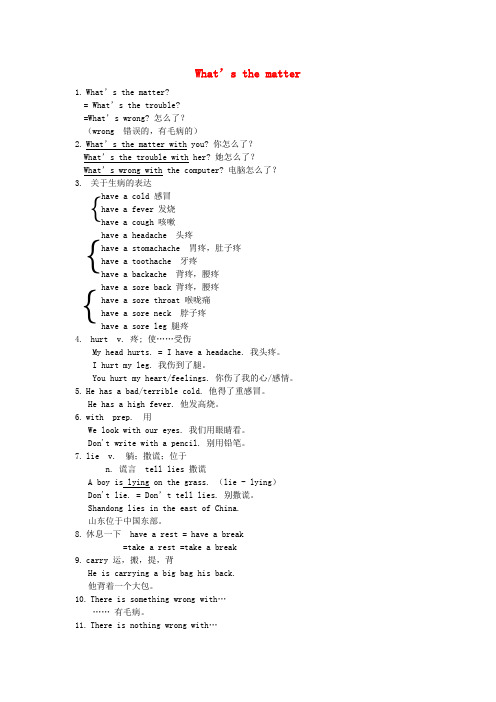
What’s the matter1.What’s the matter?= What’s the trouble?=What’s wrong? 怎么了?(wrong 错误的,有毛病的)2.What’s the matter with you? 你怎么了?What’s the trouble with her? 她怎么了?What’s wrong with the computer? 电脑怎么了?感冒发烧咳嗽头疼胃疼,肚子疼牙疼背疼,腰疼背疼,腰疼喉咙痛脖子疼腿疼疼; 使……受伤My head hurts. = I have a headache. 我头疼。
I hurt my leg. 我伤到了腿。
You hurt my heart/feelings. 你伤了我的心/感情。
5.He has a bad/terrible cold. 他得了重感冒。
He has a high fever. 他发高烧。
6.with prep. 用We look with our eyes. 我们用眼睛看。
Don't write with a pencil. 别用铅笔。
7.lie v. 躺;撒谎;位于n. 谎言 tell lies 撒谎A boy is lying on the grass. (lie - lying)Don't lie. = Don’t tell lies. 别撒谎。
Shandong lies in the east of China.山东位于中国东部。
8.休息一下 have a rest = have a break=take a rest =take a break9.carry 运,搬,提,背He is carrying a big bag his back.他背着一个大包。
10.There is something wrong with………有毛病。
11.There is nothing wrong with………没毛病。
2018年八年级英语下Unit1 what`s the matter精编练习(有答案)

2018年八年级英语下Unit1 what`s the matter精编练习(有答案)本资料为woRD文档,请点击下载地址下载全文下载地址Unit1what`sthematter?I.根据句意及首字母或汉语提示完成单词.Don`tgetstressedout,youshouldlistentosomemusic andr________2.Dongdonghasas____________.Hecan`teatanythingfor24 hours.3.Hecan`tspeakwell.hehaasoret_______________.4.Ihaveat__________.IhavetoseeadentistI`mnotfeelingwell.Ihaveaf____________.6.Ithinkyoushouldtakeyourt_______________7.Idon`tfeelwell.Ihaveah______________.8.Look!Thereisaringaroundthedog`sn___________.9.mostanimalshavefourf_____________.0.Suddenlyhefelloffatreeandh_________hislegs.Itseem edthathecouldn`tmove.II.用所给词的适当形式填空.Nancy_____________allnight,soshelookedtiredthismorning.2.Isawmanyreporterswalkingaroundyourhouse.what`sthe__________?3.youcantouchthecat`sback,butdon`ttouchits___________.4.Theboyfelloffthetreeand_________hisleftfoot.5.missyanghasa________throat,soshecan`ttalkmore.6.Thelittleboywenttoschoolwithout_____________break fastthismorning.7.Nowhisuncleis________onthesofa,enjoyingthemusic.III.按要求完成下列各题。
八年英下册unit1what's_the_matter知识练习答案
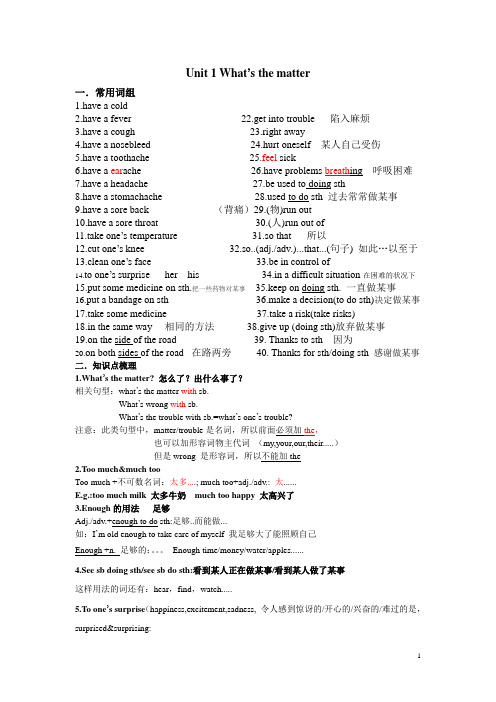
Unit 1 What’s the matter一.常用词组1.have a cold ___________2.have a fever ___________ 22.get into trouble___陷入麻烦____3.have a cough __________ 23.right away ______________4.have a nosebleed _________ 24.hurt oneself__某人自己受伤_______5.have a toothache _________ 25.feel sick__________6.have a ear ache _________ 26.have problems breath ing__呼吸困难_7.have a headache _________ 27.be used to doing sth__________8.have a stomachache _________ ed to do sth_过去常常做某事__9.have a sore back _________ (背痛)29.(物)run out__________10.have a sore throat _________ 30.(人)run out of______________11.take one’s temperature_____ 31.so that___所以______12.cut one’s knee________ 32.so..(adj./adv.)...that...(句子)_如此…以至于13.clean one’s face_________ 33.be in control of_________14.to one’s surprise___her his ____ 34.in a difficult situation在困难的状况下15.put some medicine on sth.把一些药物对某事35.keep on doing sth._一直做某事16.put a bandage on sth ________ 36.make a decision(to do sth)决定做某事17.take some medicine__________ 37.take a risk(take risks)__________18.in the same way __相同的方法______ 38.give up (doing sth)放弃做某事__19.on the side of the road ________ 39. Thanks to sth__因为______20.on both sides of the road _在路两旁_____40. Thanks for sth/doing sth_感谢做某事二.知识点梳理1.What’s the matter? 怎么了?出什么事了?相关句型:what’s the matter with sb.What’s wrong with sb.What’s the trouble with sb.=what’s one’s trouble?注意:此类句型中,matter/trouble是名词,所以前面必须加the,也可以加形容词物主代词(my,your,our,their.....)但是wrong 是形容词,所以不能加the2.Too much&much tooToo much +不可数名词:太多....; much too+adj./adv.: 太......E.g.:too much milk 太多牛奶much too happy 太高兴了3.Enough的用法足够Adj./adv.+enough to do sth:足够..而能做...如:I’m old enough to take care of myself 我足够大了能照顾自己Enough +n. 足够的;。
英语人教版八年级下册第一单元What’s-the-matter
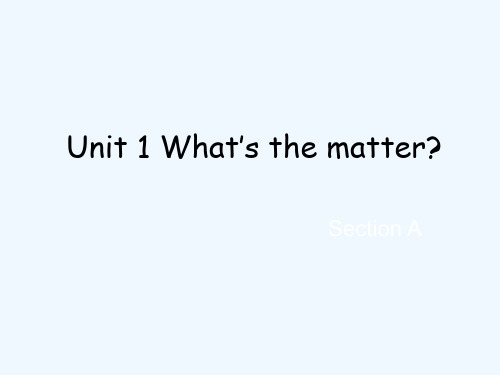
A: What’s the matter? B: I’m not feeling well.
I have a fever. A: When did it start? B: About two days ago. A: Oh, that’s too bad.
Unit 1 What’s the matter?
Section A
body
Name each part of the body
arm
ear
eye foot
leg hand
mouth
nose
tooth
neck
Follow me:
• Everybody moves your body • Nod your head and touch your face • Touch your nose and close your eyes • Touch your ears and clap your hands • Raise your arms and look at your back • Touch your stomach and tap your foot • Sit down and move your legs
What should she do? She should take some medicine.
What’s the matter with you? I have a toothache. You should see a dentist. That’s a good idea.
What’s the matter with her? She has a sore throat. What should she do?
人教新目标八年级英语下册Unit1 What’s the matter 询问健康问题及遇到麻烦时的常见表达

8/18/2017
have a headache
have a sore throat
hurt the knee
询问健康问题及 遇到麻烦时的常 用表达
创新微课
询问健康问题及遇到麻烦时的常用表达 1.What’s the matter ( with sb. ) ? =What’s wrong ( with sb. ) ? =What’s the trouble ( with sb. ) ? What’s one’s trouble ? 2. What’s happened 1 ( to sb. ) ? (某人)发生什么事了? 3. Are you OK? 你没事吧? 4. Is there anything wrong ( with sb. ) ? (某人)有什么事吗?
询问健 康问 题及 遇到麻 烦时 的常 用表达
创新微课
学以致用
1. —Tony, What’s ___ matter with you?
— I have _____ toothache.
A. a; the
1 B. the; a
C. /; the
D. the; /
2. I didn’t sleep well last night, because I _____ a cough . A. was B. went C. had D. took
8/18/2017
询问健康问题及遇到麻烦时的常用表达
8/18/2017
询问健康问题及遇到麻烦时的常用表达
创新微课
What’s the matter with you?
have a fever
have a cold
have a toothache
人教版英语八年级下册第一单元知识点
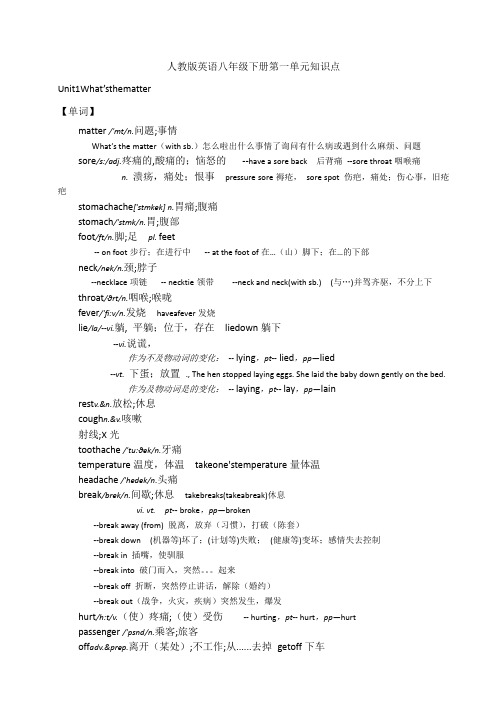
人教版英语八年级下册第一单元知识点Unit1What’sthematter【单词】matter /'mt/n.问题;事情What’s the matter(with sb.)怎么啦出什么事情了询问有什么病或遇到什么麻烦、问题sore/s:/adj.疼痛的,酸痛的;恼怒的--have a sore back 后背痛--sore throat咽喉痛n. 溃疡,痛处;恨事pressure sore褥疮,sore spot 伤疤,痛处;伤心事,旧疮疤stomachache['stmkek] n.胃痛;腹痛stomach/'stmk/n.胃;腹部foot/ft/n.脚;足pl. feet-- on foot步行;在进行中-- at the foot of在…(山)脚下;在…的下部neck/nek/n.颈;脖子--necklace项链-- necktie领带--neck and neck(with sb.) (与…)并驾齐驱,不分上下throat/θrt/n.咽喉;喉咙fever/'fi:v/n.发烧haveafever发烧lie/la/--vi.躺, 平躺;位于,存在liedown躺下--vi.说谎,作为不及物动词的变化:-- lying,pt-- lied,pp—lied--vt. 下蛋;放置., The hen stopped laying eggs. She laid the baby down gently on the bed.作为及物动词是的变化:-- laying,pt-- lay,pp—lainrest v.&n.放松;休息cough n.&v.咳嗽射线;X光toothache /'tu:θek/n.牙痛temperature温度,体温takeone'stemperature量体温headache /'hedek/n.头痛break/brek/n.间歇;休息takebreaks(takeabreak)休息vi. vt.pt--broke,pp—broken--break away (from) 脱离,放弃(习惯),打破(陈套)--break down (机器等)坏了;(计划等)失败;(健康等)变坏;感情失去控制--break in 插嘴,使驯服--break into 破门而入,突然。
人教版八年级英语下册 Unit1 What's the matter单词讲解
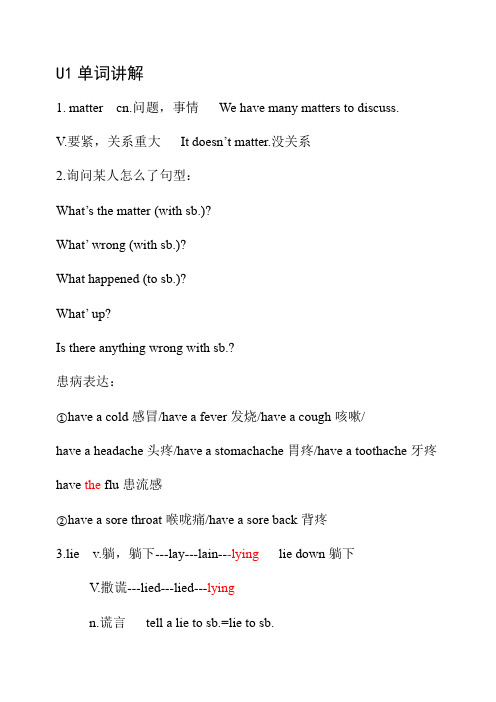
U1单词讲解1.matter cn.问题,事情We have many matters to discuss.V.要紧,关系重大It doesn’t matter.没关系2.询问某人怎么了句型:What’s the matter (with sb.)?What’ wrong (with sb.)?What happened (to sb.)?What’ up?Is there anything wrong with sb.?患病表达:①have a cold感冒/have a fever发烧/have a cough咳嗽/have a headache头疼/have a stomachache胃疼/have a toothache牙疼have the flu患流感②have a sore throat喉咙痛/have a sore back背疼3.lie v.躺,躺下---lay---lain---lying lie down躺下V.撒谎---lied---lied---lyingn.谎言tell a lie to sb.=lie to sb.4.rest n.休息&v.休息rest=have a restadj.剩余的the rest of...5.break n.休息take a break=take breaksv.①打破break the window ②违背break the law/rulebreak up打碎break down出故障break out爆发break into闯入6.get off下车---get on上车(空间大:bus)get in上车----get out of下车(空间小:car)7.trouble n.问题,苦恼have trouble/difficulty/problems(in) doing sth.eg:I have trouble in learning English.get into trouble陷入麻烦get out of trouble摆脱麻烦V.麻烦trouble sb. to do sth.麻烦某人做某事8.right away立即,马上=at once=right now=immediately9.sick adj.生病的,有病的be sick=be ill 但是ill只能做表语adj.恶心的,厌倦的feel sick感到恶心10.b reathe v.呼吸---breath n.呼吸take a deep breath深呼吸11.b e used to doing习惯于做某事used to do过去常常做某事be used to do被用来做某事eg:I used to drive to work,but now I am used to taking a bus.12.r isk v.冒险risk doing冒险做某事n.风险,危险take a risk=take risks13.accident n.事故----accidental adj.意外的---accidently adv.意外地14.sb. run out of sth.用完,用尽sth. run out15.cut---cut---cut---cuttingcut off切除cut up切碎cut down砍倒,减少cut out删除,剪下cut in插嘴16.m ean---meant---meantmean to do打算做某事mean doing意味着做某事meaning n.意思What’s the meaning of...?=What does ... mean?=What do you mean by...?meaningful adj.有意义的---meaningfully adv.meaningless adj.无意义的---meaninglessly adv.17.i mportant n.重要性---important adj.重要的the importance of... ...的重要性18.d ecision n.决定---decide v.决定decide to do=make a decision to do19.c ontrol控制,管理---controlled---controlledbe in control在控制下be out of control失去控制20.d eath n.死,死亡---die v.死---dead adj.死了的---dying adj.垂死的eg:The dog’s death makes me sad.The dog died 3 days ago.The dog was dead when I found it.21.g ive up放弃give up doing give it/them upgive away捐赠give out分发give off发出(光、热等)give in屈服。
2017-2018学年八年级英语下册 Unit 1 Whats the matter(第1课时)S

Unit 1What's the matter?第1课时 Section A (1a ~2d )(一)自主学习1.自学生词,并记住拼读及拼写。
根据句意及汉语提示完成单词。
(1)He can't work today because of a __sore__(疼痛的) back. (2)The man has a __fever__(发烧). He has to see the doctor. (3)My sister had a cold and __coughed__(咳嗽) day and night. (4)Jim has two big __feet__(脚).(5)Mrs.Wang didn't go to work today because of her __stomachache__(胃痛). 2.预习课本,找出重点短语及句子。
(1)量体温 __take__one's__temperature__ (2)躺下 __lie__down__ (3)出什么事了?__What's__ the __matter__?(4)如果明天你的头和脖子仍然疼,那么你就要去看医生。
If your __head__ and neck still __hurt__ tomorrow ,then __go__ __to__ a doctor. (二)课堂导学 Step 1 情景导入T :Hello ,everyone !Welcome back to school. After the Spring Festival ,you all look well. Are you OK ?Health is one of the most important things to us. So we should eat healthy food. We should exercise every day to make us strong. We should keep ourselves safe when we're in public. And weshould also help others when they are in danger.Question:T:But if we are ill,what should we do?S1:We should go to a doctor.S2:We should lie down and have a rest.S3:We should take some medicine.…环节说明:通过春节后师生重逢的相互问候引入健康话题。
【小初高学习]2017-2018学年八年级英语下册 Unit 1 What’s the matter
![【小初高学习]2017-2018学年八年级英语下册 Unit 1 What’s the matter](https://img.taocdn.com/s3/m/a97c6c0f3968011ca300918f.png)
Unit 1 What’s the matter?(No. 1---5)Period4Step 1 Warming-upGreet the class as usual, then have students play guessing game.T: (Ask one student to choose a card of illness and do an action, then asks)What’s the matter with him/her?The other students guess according to the action.T: What’s the matter with him/ her?S2: Did you have a toothache?S1: No, I didn’t.S3: Did you have a headache?S1: Yes, I did.Show a picture of the body. Ask students to say each part of the body.T: (Touches his own h ead and says) I have a headache, then write “headache” next to the head. Then point to the teeth and asks: What’s the matter with his teeth? Help students to answer: Oh, His tooth has a hole. He has a toothache. Then have students to finish Self Check 1 alone.Check the answers and have them say more health problems.Step 2 1aWhen these accidents happen, what should you do ? Put the actions in order. Check the answers.Step 3 1bplay the tape ,let ss listen to the tape and check the problems you hear.Step 4 1cListen again , write the letter of each treatment next to the problems you checked in the chart above. Check the answers.Step 5 1dRole –play a conversation. Use the information in 1b and 1c. Step 6 Summary and homeworkDo exercise on Tongbu P6教后反思:。
2017-2018学年八年级英语下册 Unit 1 What’s the matter Period

Unit 1 What’s the matter?(No. 1---5)Period 5Step 1 Warming-upHave a conversation with students.Step 2 Pre-reading 2aAccidents or problems can sometimes happen when we do sports.Write the letter of each sport next to each accident or problem that can happen.A = soccerB = mountain climbingC = swimming__ fall down __ have problems breathing __ get hit by a ball__ get sunburned __ cut ourselves __ hurt our back or arm (Key: B C / A C / B A)Step 3 While- reading 2bRead the passage and underline the words you don’t know.Then look up the words in a dictionary and write down their meaning.3. Reading tasks:Step 4 2cRead the statements and circle True, False or Don’t Know.1 Aron almost lost his life three times because of climbing accidents. True False Don’t know2 Aron had a serious accident in April 2003. True False Don’t know3 Aron ran out of water after three days. True False Don’t know4 Aron wrote his book before his serious accident. True False Don’t know5 Aron still goes mountain climbing. True False Don’t knowStep 5 2dRead the passage again and answer the questions. Check the answers. Step 6 Difficulties1,be interested in sth ./ doing sth.2.lose one’s life.3.run out/ run out of4.save one’s life.5.be ready to do sth.6. get out of7.keep on doing sth.8.the importance of making good decisions.9.be used to10. take a risk11.be in control ofStep 7 Post-readingRetell according to the chart on Tongbu P7Step 8 Summary and homework.教后反思:2。
- 1、下载文档前请自行甄别文档内容的完整性,平台不提供额外的编辑、内容补充、找答案等附加服务。
- 2、"仅部分预览"的文档,不可在线预览部分如存在完整性等问题,可反馈申请退款(可完整预览的文档不适用该条件!)。
- 3、如文档侵犯您的权益,请联系客服反馈,我们会尽快为您处理(人工客服工作时间:9:00-18:30)。
Unit 1 What’s the matter?(No. 1---5)
教学目标:
(一)知识目标
Vocabulary:
Matter, stomachache, foot, neck, lie, neck, throat, fever, lie down, cough, toothache, headache, break, take breaks, hurt, passenger, trouble, hit, right away, herself, knee, nosebleed, ourselves, climber, be used to doing, take risks, accident, situation, kilo, knife, cut off, blood, mean, get out of, the importance of, decision, death, give up, nurse
Patterns:
1.运用以下句式谈论身体不适
--What’s the matter with…? -- He has a…/I have a…
-- Do you have a…?-- Yes, I do./No, I don’t.
-- Does he have a …?-- Yes, he does./No, he doesn’t.
2. 运用以下句式给予他人保健措施
-- What should… do? -- … should动词原形…
-- Should…动词原形…?-- Yes, … should./ No, …shouldn’t
(二)能力目标
Train students’ listening skills and communicative skills.
(三)情感目标
Students can talk about their illness and give advice.
教学方法: 1. Task-Based Language Teaching
2. The cognitive approach
3. The oral approach
教学媒体:
多媒体,录音机投影仪
课时分配:
Period 1: Section A (1a--- 2d)
Period 2: SectionA (3a – 3c)
Period 3: Section A (Grammar focus- 4c)
Period 4: Section B (1a-1d)
Period 5: Section B (2a-2e)
教学过程
Period 1
Step 1 Leading in
1. Sing a song and do some actions
2. Play a game and revise some words we have learned.
3. (Today we’ll learn some parts of the body .)
Look at the picture and teach new words.
Step 2 Pre-task
1. Read the new words by the Ss first .
2. Then check the Ss if they can read the new words by themselves correctly . If there is a mistake ,correct .
3. Practice reading the new words . Give them 6 minutes .
4. Have a competition between boys and girls .Write the words you remembered just now on the blackboard .
1a.Do this part by the Ss first. Write the correct letter after the name of each body part on the list
Play a game .All the Ss close your books ,we’ll have a instructor to say :Touch your nose /head /right ear … Let’s see which student do it correctly and quickly .First all the Ss do this game .Then have competitions between boys and
girls .5 boys and 5girls to the front to do what the instructor said .if you are wrong ,please go back to your seats ,the last one who stands at the front is the winner .
Step 3 While-task
1. Look at the picture and learn the main sentences.
A: What’s the matter with you ?
B: I have a cold.
2. SB Page 1,1c Look at the pictures , work in pairs and act out.
3. SB Page1 , 1b .
(1) Listen and check the answers .
(2) Listen and fill in the blanks.
4. Listen to the tape about 2a and 2b.
5. Look the pictures and Practice :
A What’s the matter with sb?
B He/ She …..
A What should he / she do?
B He/ She should….
6. Learn 2d
Read it and do excise on Tongbu.
Step 4 Post-task
同桌之间设计一个医生与病人之间的对话.
Step 5 Exercises in class
教后反思:。
